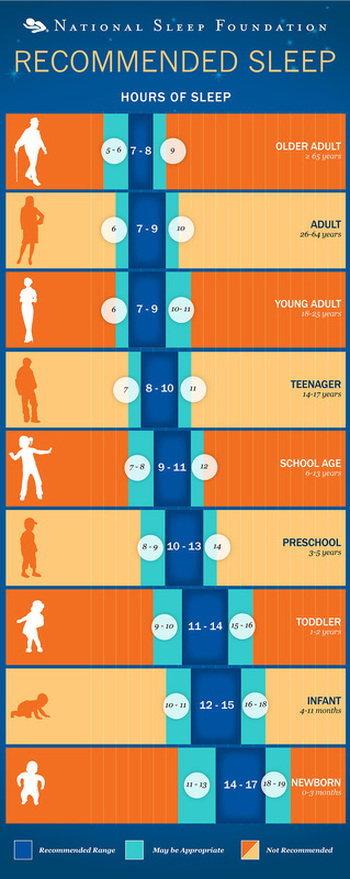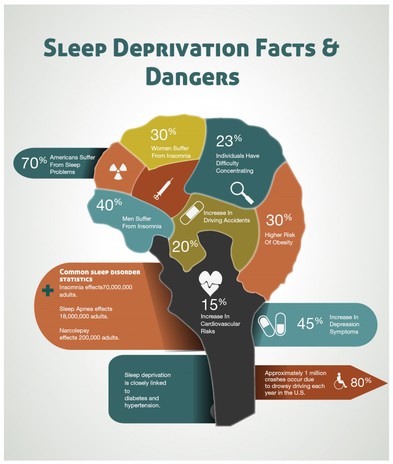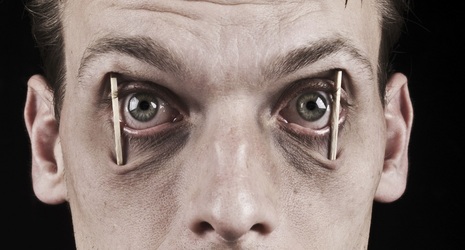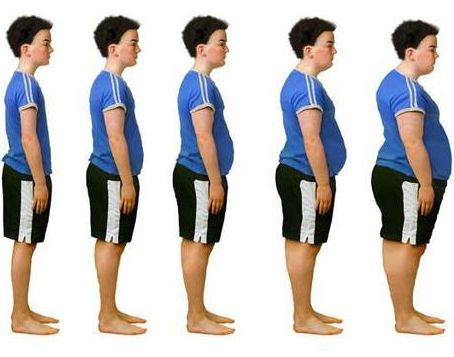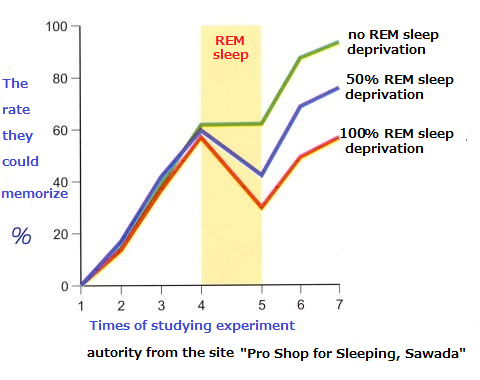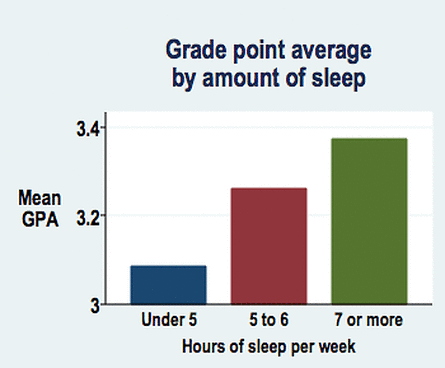|
Sleep is food for the body, and to live. Without the food or the right amount of sleep, there are consequences. These effects can range from feeling tired to extremities such as death or diseases...
|
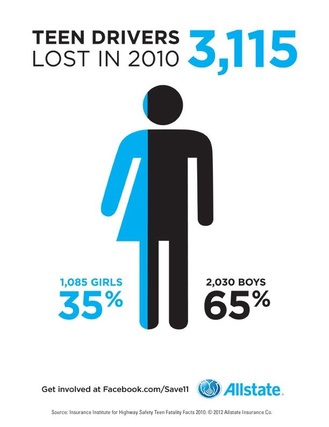
Car Crashes and Unintentional injuries:
Another big consequence of teen sleep deprivation is the increased risk of unintentional injuries and even death. According to research done by the National Sleep Foundation, fatigue is one of the biggest reasons of car crashes. At least 100,000 traffic accidents each year are caused by drowsiness. A North Carolina study found that 55% of fall asleep crashes involved drivers under the age of 25. Many juniors and seniors have their license and drive to school sleep deprived. Junior and Senior year are two of the most important years of schooling, within those years are the stress of SATs, ACTs, college acceptance, extracurricular activities, and APs. Students have to stay up late, and sometimes get only a couple hours of sleep a night. It has been said that "Parents should not let sleep deprived adolescents get behind the wheel anymore than they would if their kid had been drinking". In addition to car crashes, there is the concern of accidents. A student named Gabriel Levine had been sleeping for 3 to 4 hours a night, and one night he went to get a snack at 3am and instead of cutting the apple, he sliced through his thumb, straight to the bone.
Mental Illnesses and Suicide:
The National Sleep Foundation surveyed more than 1600 teenagers and their data showed that more than half showed signs of depression. 56% said that they had felt anxious and stressed out. Many said that all they could see, was a hopeless future, "It really is a vicious cycle: sleep deprivation leads to stress in school, including daytime drowsiness and poor school performance; emotional and mental stress such as depression..." Some may suggest that sleep deprivation is a trigger to mental illnesses. In the Huffington Post, an article was published that featured a psychology professor named Matthew Feldner who said that
"Current thinking suggests the impact of sleep loss on emotion is likely very complex," and that "One leading idea is that losing sleep impairs functioning of the prefrontal cortex region of the brain. This region of the brain is involved in complex behavior and thinking, including regulating emotional experience. Therefore, it is likely that impaired functioning of the prefrontal cortex plays a critical role in elevated emotionally observed among sleep deprived people, because our nervous system is less able to reduce emotion once it has been triggered."
In addition to depression, the rate of suicides are also connected to sleep deprivation. "At least three quarters of clinically depressed people struggle with sleep, and insomnia is a well proven risk factor for suicide across different cultures and age groups." People who are sleep deprived have a tendency to lose focus and concentration, therefore their problem solving skills are not as sharp. If they come across something tough to process or think through, they are immediately emotionally blocked.
Obesity:
There has also been signs of obesity and sleep deprivation interlocking as well. A test by two sleep specialists at New York Weill Cornell Medical center tested on healthy men and women with the same body mass. The difference was that half were average sleepers and the other half averaged 6.5 hours a night or less. It was recorded the glucose tolerance tests showed that the abnormal sleepers experienced hormonal changes that would affect their future body weight and long term health. To help maintain their blood sugar levels, the short sleepers had to make 30% more insulin than the people who slept the average amount. It had also been said that people who do not sleep the normal or average amount may have abnormalities in their calorie intake. There is also chemical changes in your body such as the amount of leptin and ghrelin. Leptin is what decreases hunger and ghrelin increases hunger. Lack of sleep makes your brain think that you are not getting enough energy, and that you must eat, therefore the hormone leptin is suppressed while ghrelin skyrockets and makes you more hungry even when you have had enough to eat.
There has also been signs of obesity and sleep deprivation interlocking as well. A test by two sleep specialists at New York Weill Cornell Medical center tested on healthy men and women with the same body mass. The difference was that half were average sleepers and the other half averaged 6.5 hours a night or less. It was recorded the glucose tolerance tests showed that the abnormal sleepers experienced hormonal changes that would affect their future body weight and long term health. To help maintain their blood sugar levels, the short sleepers had to make 30% more insulin than the people who slept the average amount. It had also been said that people who do not sleep the normal or average amount may have abnormalities in their calorie intake. There is also chemical changes in your body such as the amount of leptin and ghrelin. Leptin is what decreases hunger and ghrelin increases hunger. Lack of sleep makes your brain think that you are not getting enough energy, and that you must eat, therefore the hormone leptin is suppressed while ghrelin skyrockets and makes you more hungry even when you have had enough to eat.
Memory and Learning Ability:
It has been proven and theorized that there is a solid connection between memory and learning ability and sleep. There are three types of memory function:
Acquisition- introduction of new information
Consolidation- the process of retaining the information
Recall- ability to apply or access the information
The first kind of memory is declarative memory which is factual information, these usually begin in what, such as what you had for breakfast this morning. Scientists have discovered that REM sleep which is the dream stage has involvement with emotional and complex pieces of declarative memory but not always with information that is simple. Since declarative information is mainly memorization, slow wave sleep or SWS which is also deep sleep helps with declarative memory because it processes the newly acquired information.
Another type of memory is procedural memory, which is the memory of how to do things, the application of memories. REM sleep also seems to show an impact on the consolidation of procedural memory. Motor learning which is the capability to respond is impacted by the earlier and lighter stages of sleep while other tupes of visual learning depends on the amount of deep SWS sleep and REM sleep.
Lack of sleep leads to the overworking of neurons in our brains. They lose function such as being able to coordinate information, and the ability to apply our memories. Judgement also becomes impaired because we lose the ability to fully and thoroughly assess the situation, plan accordingly, and choose what is considered to be the right option.
It has been proven and theorized that there is a solid connection between memory and learning ability and sleep. There are three types of memory function:
Acquisition- introduction of new information
Consolidation- the process of retaining the information
Recall- ability to apply or access the information
The first kind of memory is declarative memory which is factual information, these usually begin in what, such as what you had for breakfast this morning. Scientists have discovered that REM sleep which is the dream stage has involvement with emotional and complex pieces of declarative memory but not always with information that is simple. Since declarative information is mainly memorization, slow wave sleep or SWS which is also deep sleep helps with declarative memory because it processes the newly acquired information.
Another type of memory is procedural memory, which is the memory of how to do things, the application of memories. REM sleep also seems to show an impact on the consolidation of procedural memory. Motor learning which is the capability to respond is impacted by the earlier and lighter stages of sleep while other tupes of visual learning depends on the amount of deep SWS sleep and REM sleep.
Lack of sleep leads to the overworking of neurons in our brains. They lose function such as being able to coordinate information, and the ability to apply our memories. Judgement also becomes impaired because we lose the ability to fully and thoroughly assess the situation, plan accordingly, and choose what is considered to be the right option.
If you would like to see if your sleep patterns are healthy, take this sleep profiler...

